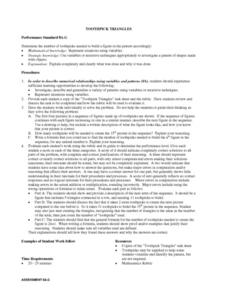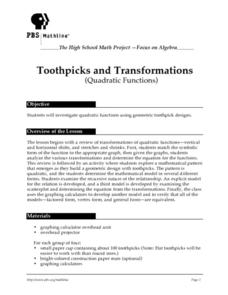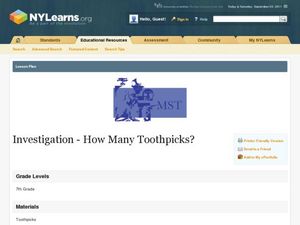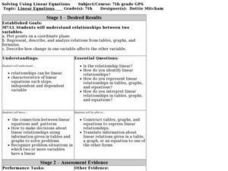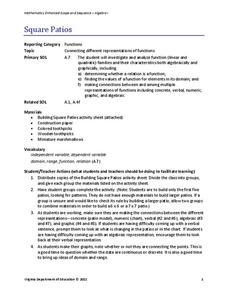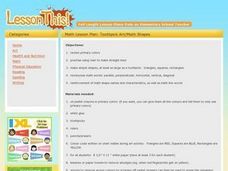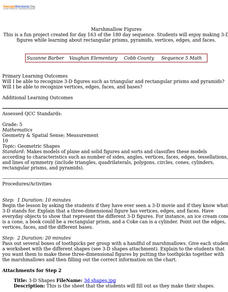Curated OER
Toothpicks, Gumdrops, and Polyhedrons
Sixth graders use toothpicks and gumdrops to make prisms and pyramids. This helps them explore the relationship betweeen faces, vertices, and edges.
Curated OER
Toothpick Triangles
Explore patterns, variables, and mathematical relationships when you examine patterns with toothpicks and determine the next sequence of figures. Your class writes and justifies a formula based on the sequence. An answer key is included.
Curated OER
Investigation-How Many Toothpicks?
Seventh graders use toothpicks to investigate a series of designs and identify patterns. Data is organized and analyzed using tables and graphs, and students make generalizations using algebraic expressions.
Curated OER
Toothpick Triangles
Students draw a chart (included in the lesson) to use with their investigation. They review terminology of triangles and receive toothpicks to use in the lesson. Beginning with three toothpicks, students form a triangle. They complete...
Curated OER
Marshmallow Fun Day - math
Early learners rotate to different classroom centers and participate in six activities based on using marshmallows to review concepts learned. They make: marshmallow sculptures (geometric shapes), the shape of mittens using colored...
Curated OER
Toothpick Tops
Pupils assembly tops and name them 1 - 12 so that they can compare their results. They guess which top they think will spin the best and then record data on "Toothpick Top" table. Using a stopwatch or clock to measure and record the spin...
Curated OER
Skate Borders
Elementary schoolers explore how making different rectangular shapes with the same perimeter has an affect on the area of those shapes. Learners use the worksheet embedded in the plan to design their own skateboarding track. They use...
PBS
Toothpicks and Transformations
High schoolers investigate quadratic functions using geometric toothpick designs. They review transformations of quadratic functions-vertical and horizontal shifts, and stretches and shrinks. Students match the symbolic form of the...
Curated OER
Marshmallow Geometry
In this three-dimensional shapes geometry instructional activity, learners identify geometric solids and name their properties. They define "face," "edge," and "vertex," and construct geometric solids using marshmallows as vertices and...
Curated OER
How Many Toothpicks?
Students investigate different geometric patterns. In this geometry lesson, students create different shapes using toothpicks. They create different patterns and designs and complete a charts using different measurements.
Curated OER
Measuring the Egyptian Way using the Pythagorean Theorem
Students measure using the Pythagorean Theorem. In this geometry instructional activity, students solve right triangles using the properties of the Pythagorean theorem. They apply the same knowledge to solving story problems.
Curated OER
Solving Using Linear Equations
Seventh graders explore linear equations. They observe the relationship between linear equations an patterns. Students make decisions using information given in graphs to solve linear equations. They perform a toothpick activity to...
K20 LEARN
Didn’t We Already Learn That Pattern? Functions/Arithmetic Sequences
Just how many toothpicks does the pattern take? After watching a video of someone building a pattern with toothpicks, groups create methods to find the number of toothpicks needed to accomplish that task. Groups either use explicit...
Curated OER
Measuring Angles
Sixth graders identify and measure right, acute, obtuse, and straight angles. In this geometry lesson, 6th graders review the definition of each angle and are shown examples of each specific angle. Students use toothpicks, gumdrops, and...
Virginia Department of Education
Square Patios
Build a patio from toothpicks and marshmallows to analyze functions! Learners look for patterns in the data as they create different size patios. As they discover patterns, they make connections between the different representations of...
Curated OER
Toothpick Art
Learners review primary colors and practice making straight lines. In this visual arts instructional activity, students paint simple shapes as large as a toothpick, using specific primary colors. During the construction of the shapes...
Curated OER
Marshmallow Figures
Students enjoy making 3-D figures while learning about rectangular prisms, pyramids, vertices, edges, and faces. After a lecture/demo, students use marshmallows, toothpicks and a worksheet imbedded in this lesson to create 3 dimensional...
Curated OER
Toothpick squares
Learners state the general rule for a practical situation. They describe a continuing pattern. They use toothpicks to help visualize the problem and answer it correctly.
Curated OER
Cookie Mining
Students simulate coal mining with chocolate chip cookies and toothpicks. They investigate the costs associated with mining coal.
Curated OER
Measuring Real Stuff
Looking for a good lesson on measurement? This one could be for ytou! Learners select and use appropriate nonstandard units to measure and compare lengths and weights of real-life objects. They use problem-solving skills to design a...
Utah Education Network (UEN)
Geo Shapes
Invite your first graders to compose and decompose two and three-dimensional figures with this fun, hands-on lesson. They investigate and predict the results of putting together and taking apart two-dimensional shapes with rubber bands...
Curated OER
Modeling the Electromagnetic Spectrum
Learners construct a model of an electromagnetic spectrum using play-doh and string. They use exponents and plot the radio/microwave, infrared, and visible bandwidths of the spectrum.
Curated OER
Migrating Math
Pupils practice estimating distance traveled while walking. Also can be used to introduce backpacking/hiking or as a daily warm-up. Measure the blacktop/cafeteria/playground, then determine how many times around make a mile.
Virginia Department of Education
Relationships Round Robin
Mathematics is all about patterns. Young mathematicians analyze geometric patterns to write algebraic expressions. They use the expressions to predict future stages of the patterns.



